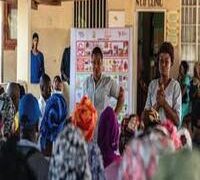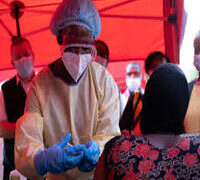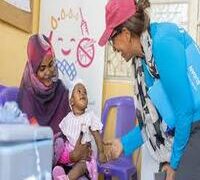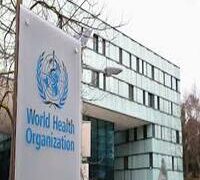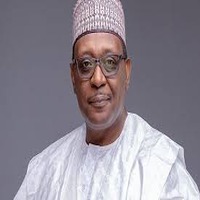The Coordinating Minister of Health and Social Welfare, Prof. Muhammad Pate, on Wednesday said patient satisfaction with healthcare facilities and primary healthcare services is at 74 per cent.
Pate, who said this at the 2025 Joint Annual Review of the Health Sector themed, “All hands, one mission: Bringing the Nigerian health sector to light,” noted that confidence in the overall direction of the health system has risen to 55 per cent.
The Joint Annual Review is one of Nigeria’s most important accountability platforms for the health sector, convening stakeholders to review progress, assess performance, and align priorities for the year ahead.
Last year, the ministry launched the country’s first-ever State of Health Report, providing a comprehensive analysis of the nation’s healthcare system and outlining a clear way forward for the sector.
In his speech, the minister stated that citizens’ perception surveys conducted in 2023, 2024, and 2025 show encouraging results.
“In line with President Bola Tinubu’s directive that our policies must respond to the needs and experiences of Nigerians, we conducted citizens’ perception surveys in 2023, 2024, and again in 2025. Thousands of Nigerians shared their experiences and expectations of the health system.
“The findings are encouraging. The proportion of citizens who believe that the government considers their views in health decision-making now stands at nearly half the population.
Confidence in the overall direction of the health system has risen to 55 percent, while confidence in the government’s capacity to manage health emergencies is now at 67 percent.
“Patient satisfaction with healthcare facilities and primary healthcare services remains strong at 74 percent. This is a commendable result, given the challenges our system still faces,” he said.
He, however, noted that citizens identified affordability as a major barrier to accessing healthcare.
“However, citizens have clearly indicated that affordability remains a major concern. Access to services is improving, but affordability must improve further. I am pleased to note that, through the commitment of the Ministers of Finance and Budget, plans such as the Medical Relief Programme and expanded social health protection are underway to ease these pressures.
“Health insurance coverage has also grown. Two years ago, it stood at around six to seven percent; today, it has reached 12 per cent, driven by the implementation of mandatory health insurance and the operationalisation of the Vulnerable Groups Fund.
“These results show that the measures we have put in place to reduce fragmentation, improve coordination, and enhance national ownership are beginning to yield real results,” he added.
He stated that the ministry will consolidate the gains, sustain financing, and continue expanding health insurance coverage, especially for the poor and vulnerable.
He said, “We must strengthen the primary health care system, which remains the foundation of our journey to Universal Health Coverage. We also thank the National Assembly, the Senate, and the House of Representatives for their unwavering oversight and support.
“Appropriations and releases of funds are increasingly reflecting in real sector performance, and we will continue to ensure that every naira invested in health translates into measurable outcomes for Nigerians.
To achieve our goals, we will advance the localisation agenda, reducing dependency on external assistance by mobilising domestic resources, boosting local manufacturing of medicines, vaccines, and health technologies, and building resilient supply chains.
“We must also ensure that state and local governments invest more in health, education, water, sanitation, and nutrition, consistent with the President’s ward-based development approach, which is perhaps the most practical strategy for lifting communities across Nigeria.
“We are also exploring innovative financing options such as fiscal measures on sugar-sweetened beverages, public-private partnerships, and digital solutions that enhance transparency and accountability in the use of health funds.”
He emphasised that in the last year, more than 20,000 frontline health workers have been recruited into federal tertiary hospitals to fill the longstanding gaps.
“Within the last few months, over N50bn has been approved to address arrears, allowances, and professional needs across cadres.
We are constructively engaging with health professional leaders to resolve long-standing issues responsibly. Our call to all health workers is simple: put the Nigerian person at the centre of attention. If we do that, all other issues can be resolved,” he added.
In his remarks, the Minister of State for Health and Social Welfare, Dr. Iziaq Salako, noted that the ministry is implementing and advancing bold reforms to address the many challenges faced by the Nigerian health system, including workforce shortages, infrastructural deficits, financing gaps, fragmentation, and decreasing confidence in the system.
Salako said the operationalisation of the National Health System Reform and Investment Initiative is framed as a strategic investment, with potential annual economic savings of N4.8tn from preventable diseases and N850tn retained domestically by reducing medical tourism.
“The Operationalisation of the NHSRII is not just an opportunity for expense, it is an investment with clear returns. We estimate an economic return worth N4.8tn annually saved from losses to preventable disease recoverable through the blueprint.
“We are equally poised to achieve a significant reversal of the direction of medical tourism, with the potential to domestically retain an estimated N850bn spent abroad annually by Nigerians on medical tourism.
“We foresee a massive social return in lives saved, with a potential 50 per cent reduction in preventable maternal and child deaths, advancing equity by closing the almost 19-year life expectancy gap between states. NSHRII implementation will ensure that our health security is strengthened and we have a pandemic-ready health system.
“At the last count, under the roadmap, we have put in place not less than 21 new strategic policies to drive our health agenda. Health insurance coverage is being expanded, new health infrastructure is being provided, including over 500 new high-impact projects, 13 new federal tertiary health institutions, and six cancer centres of excellence.
The PHC revitalisation agenda is progressing, and the health research ecosystem is better organised to reflect domestic priorities.
“Though the National health financing budget from the government is still far below the Abuja declaration of 15 per cent, we have made some progress in the last two years, even as we continue to explore additional innovative mechanisms to mobilise more financial resources for health.
“The Federal Ministry of Health and Social Welfare strongly supports the ongoing advocacy of the health committees in the national assembly to increase the BHCPF from its current one per cent to two per cent of the consolidated revenue fund.
“There has also been a paradigm shift with respect to disbursement of health budgets, as exemplified by the BHCPF, which is tied to key Disbursement Link Indicators that ensure that funds are disbursed for results rather than processes,” Salako highlighted.
PUNCH NEWS.







